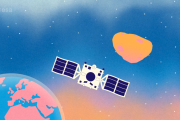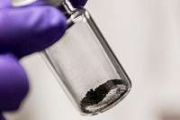
Copernical Team
Reflect Orbital Selected for SBIR Phase II Contract by AFWERX to Advance Satellite-Based Sunlight Redirection Technology
 Reflect Orbital announces it has been selected by AFWERX for a Phase II SBIR contract in the amount of $1.25 million focused on its sunlight on demand satellite reflector technology to address the most pressing challenges in the Department of the Air Force (DAF). The Air Force Research Laboratory and AFWERX have partnered to streamline the Small Business Innovation Research (SBIR) and Small Busi
Reflect Orbital announces it has been selected by AFWERX for a Phase II SBIR contract in the amount of $1.25 million focused on its sunlight on demand satellite reflector technology to address the most pressing challenges in the Department of the Air Force (DAF). The Air Force Research Laboratory and AFWERX have partnered to streamline the Small Business Innovation Research (SBIR) and Small Busi NASA's IMAP Spacecraft Readied for Launch Preparations
 Technicians removed NASA's IMAP (Interstellar Mapping and Acceleration Probe) spacecraft from its shipping container on Thursday, May 29, after transferring it from the airlock into the high bay at the Astrotech Space Operations Facility near the agency's Kennedy Space Center in Florida. The IMAP spacecraft arrived at the facility on May 10, coming by truck from NASA's Marshall Space Flight Cent
Technicians removed NASA's IMAP (Interstellar Mapping and Acceleration Probe) spacecraft from its shipping container on Thursday, May 29, after transferring it from the airlock into the high bay at the Astrotech Space Operations Facility near the agency's Kennedy Space Center in Florida. The IMAP spacecraft arrived at the facility on May 10, coming by truck from NASA's Marshall Space Flight Cent Super-Earth discovered in habitable zone of Sun-like star via TTV technique, paving way for 'Earth 2.0' searches
 "Are we alone?" This ancient question has occupied humanity's mind for a long time. In 1995, the discovery of the first exoplanet orbiting a Sun-like star opened the door to exploring this profound mystery. The study of exoplanets has become one of the most critical scientific topics of the 21st century, with profound implications for understanding planetary formation, evolution, and the origin
"Are we alone?" This ancient question has occupied humanity's mind for a long time. In 1995, the discovery of the first exoplanet orbiting a Sun-like star opened the door to exploring this profound mystery. The study of exoplanets has become one of the most critical scientific topics of the 21st century, with profound implications for understanding planetary formation, evolution, and the origin NASA pioneer Dr. Stanley Sander dies at age of 80
 One of NASA's top ozone depletion and air pollution scientists, credited with enhancing local air pollution measurement tools and dozens of other climate related research advancements, has died at the age of 80.
Dr. Stanley Sander was broadly recognized for his work on research on atmospheric chemistry at the Jet Propulsion Laboratory where he started his career in 1971.
"Stan ma
One of NASA's top ozone depletion and air pollution scientists, credited with enhancing local air pollution measurement tools and dozens of other climate related research advancements, has died at the age of 80.
Dr. Stanley Sander was broadly recognized for his work on research on atmospheric chemistry at the Jet Propulsion Laboratory where he started his career in 1971.
"Stan ma Japanese company aborts Moon mission after assumed crash-landing
 Japan's hopes of achieving its first soft touchdown on the Moon by a private company were dashed Friday when the mission was aborted after an assumed crash-landing, the startup said.
Tokyo-based ispace had hoped to make history as only the third private firm - and the first outside the United States - to achieve a controlled arrival on the lunar surface.
But "based on the currently ava
Japan's hopes of achieving its first soft touchdown on the Moon by a private company were dashed Friday when the mission was aborted after an assumed crash-landing, the startup said.
Tokyo-based ispace had hoped to make history as only the third private firm - and the first outside the United States - to achieve a controlled arrival on the lunar surface.
But "based on the currently ava Trump-Musk showdown threatens US space plans
 SpaceX's rockets ferry US astronauts to the International Space Station. Its Starlink satellite constellation blankets the globe with broadband, and the company is embedded in some of the Pentagon's most sensitive projects, including tracking hypersonic missiles.
So when President Donald Trump threatened on Thursday to cancel Elon Musk's federal contracts, space watchers snapped to attenti
SpaceX's rockets ferry US astronauts to the International Space Station. Its Starlink satellite constellation blankets the globe with broadband, and the company is embedded in some of the Pentagon's most sensitive projects, including tracking hypersonic missiles.
So when President Donald Trump threatened on Thursday to cancel Elon Musk's federal contracts, space watchers snapped to attenti Musk's Starlink gets key license to launch satellite internet services in India
This request seems a bit unusual, so we need to confirm that you're human. Please press and hold the button until it turns completely green. Thank you for your cooperation!
Press and hold the button
If you believe this is an error, please contact our support team.
185.132.36.159 : 2ffa950d-05ff-47be-874e-e9ef52e1
Week in images: 02-06 June 2025

Week in images: 02-06 June 2025
Discover our week through the lens
Private lunar lander from Japan crashes into moon in failed mission
This request seems a bit unusual, so we need to confirm that you're human. Please press and hold the button until it turns completely green. Thank you for your cooperation!
Press and hold the button
If you believe this is an error, please contact our support team.
185.132.36.159 : 07b9dc47-1d89-4a6c-aaba-cf3bd678
Why Elon Musk sees Mars as the only long term option for humanity
 Elon Musk, the visionary behind SpaceX, Tesla, and Neuralink, is known for his bold ambitions and groundbreaking innovations. Among his most daring goals is building a human settlement on Mars. For Musk, this isn't just a futuristic dream, but a necessary step for ensuring humanity's long-term survival.
He has repeatedly emphasized that humanity must become a multi-planetary species to ens
Elon Musk, the visionary behind SpaceX, Tesla, and Neuralink, is known for his bold ambitions and groundbreaking innovations. Among his most daring goals is building a human settlement on Mars. For Musk, this isn't just a futuristic dream, but a necessary step for ensuring humanity's long-term survival.
He has repeatedly emphasized that humanity must become a multi-planetary species to ens 






























